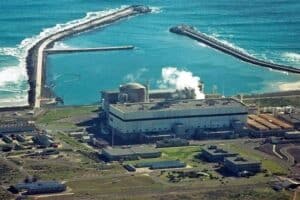Those against nuclear say the resources needed and potential harms are too great, while an industry expert says it is the way of the future.

Nuclear energy is a fission rod of contention that superheats the opinions of opponents.
Anti-nuclear proponents celebrated a win last week as Minster of Electricity and Energy Kgosientsho Ramakgopa withdrew his gazette on an intended nuclear procurement.
Although he has accepted calls for transparency and greater public participation in the process, the minister remained adamant that nuclear was a part of the country’s energy future.
‘Pace and scale we can afford’
Earthlife Africa and Southern African Faith Communities’ Environment Institute (SAFCEI) are the parties fighting Ramakgopa the hardest.
While environmental concerns are central to their case against the government’s plans to procure nuclear power generation, the pair argued the economic circumstances dictated that nuclear is not the correct path.
ALSO READ: Minister Ramakgopa withdraws nuclear procurement gazette
Citing huge costs and lengthy construction periods, SAFCEI Executive Director Francesca de Gasparis said essential public services deserve to be prioritised.
“It makes no sense to pour hundreds of billions of rands into new nuclear energy that will do nothing to address our current energy crisis,” stated De Gasparis.
Believing renewables presented a more viable option, she said the renewable industry created jobs through manufacturing, installation, maintenance and operations, among others.
“The future of energy for Africa is renewables. Fossil fuels and nuclear cannot compete with it, in terms of cost to the consumer, speed of installation and impact on the environment,”
New plans required
Ramakgopa stated that the Integrated Resource Plan (IRP) 2019 mandated the pursuit of nuclear, but SAFCEI argued that the additional 2500 megawatts may not be needed.
Earthlife Africa Johannesburg Director Makoma Lekalakala suggested a new framework was imminent.
“It is only when the IRP 2023 is gazetted that we can think of what the energy mix should look like,” stated Lekalakala.
ALSO READ: ‘We are proceeding with it’: Government will defend nuclear power plan – Ramokgopa
She added that a cost-benefit study must be conducted to ensure local economies and the concerns of affected communities are considered.
“Moreover, when we give [communities] the facts about nuclear power and its potential to cause harm, they do not want it.”
Ghosts of Chernobyl and Fukushima
The two biggest nuclear disasters of the last forty years have cemented the perception of nuclear energy.
Riaan Marshall, a retired professional engineer who began his career at Eskom, before moving to Europe where he would serve as an executive at DNV GL Energy, said Chernobyl and Fukushima were not a true reflection of nuclear power generation.
“Chernobyl was bad maintenance. Fukushima was bad design”, Marshall told The Citizen, explaining that the Japanese unit had poorly situated auxiliary generators.
ALSO READ: Koeberg Unit 1 granted licence extension to operate until 2044
He now lives in France, a nation he says relies predominantly on nuclear energy. It’s a stone’s throw from the United Kingdom where EdF Energy operate eight nuclear power stations.
“Here in France, 90% of the 100 gigawatts of installed power generation is nuclear. The rest is 7% hydro and 3% renewable. EdF had proven well-designed and maintained nuclear fission plants to be safe and reliable,” Riaan said.
Which is truly ‘the way’
ITER is a multi-national collaborative organisation researching nuclear fusion. The body, whose name is Latin meaning ‘the way’ includes three of South Africa’s Brics partners: China, Russia and India.
The member states are at an advanced stage of commissioning these fusion reactors, however, testing will only be complete in the late 2040s at the earliest, perhaps illustrating De Gasparis’ point.
“Fusion is the energy source of the future. It works on the same self-sustained principle as the sun. In case of an extinction of the process in a fusion plant, there is no meltdown hence no contamination risk,” asserted Marshall.
South Africa may have many challenges now, but the future will arrive whether they are addressed or not.
NOW READ: Increase in unemployment as various industries shed jobs






